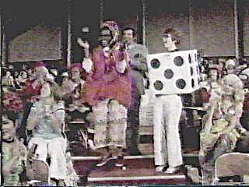Have you noticed that politics is becoming more like television? There was a day — long before we were born — when politics was about ideas. Well … ideas, money and power. But at least there were real ideas involved back when politics was communicated solely through spoken or written words.
Today, politics is all a show. But it’s not just a spectator thing. It’s like a giant game show. With the help of the media, politics has become an elaborate version of the old game show, “Let’s Make a Deal.”
You all know how the game is played. Hundreds of people dress in ridiculous costumes, hoping for the chance to trade their dignity for unknown riches — just like those of us who line up like Dorothy and her pals asking the Wizard of Oz for gifts. But that’s mixing metaphors. Let’s look at the ways in which democracy is like “Let’s Make a Deal.”
First, everything’s apparently orchestrated by a slick huckster. In the TV show, we have Monty Hall. In real life, we have Monty Media. Yes, the media are there to make sure the right ideas are discussed, absorbed and approved of, shaping the conversation and excluding points of view they consider to be “outside the mainstream.” By shaping the conversation and guiding the process, the media decide which players get to play and what games they’re allowed to play.
 Second, the contestants act like fools to get noticed — and the loudest fools get to play the game. On the show, people would dress like chickens or dice to look goofy and get on TV. In real life, people from interest groups who want things from government march through the streets or break store windows or just shovel lots of money at politicians, all of which get them noticed by either the media or the politicians.
Second, the contestants act like fools to get noticed — and the loudest fools get to play the game. On the show, people would dress like chickens or dice to look goofy and get on TV. In real life, people from interest groups who want things from government march through the streets or break store windows or just shovel lots of money at politicians, all of which get them noticed by either the media or the politicians.
It might be a company seeking protection from “unfair” competition. It might be a union wanting special rules to force workers to give them money. Or it could be people of various colors, creeds or planetary origins who want special treatment. Those who get noticed get to play various games — which may or may not lead to what they want. But they entertain the people watching on TV at home.
Third, someone else chooses the prizes — and they’re not necessarily what you really want. On the show, you might get a toaster as a prize. Or a crock pot. Or a mink coat. Now, you might not like toast or need a crock pot. But someone else decided who the prizes are for you. In real life, politicians decide what we get for the tax money they extort. They decide how much we pay and what we get to pay for — which roads get built, which wars get fought and which neighborhoods are worthy of having fire stations nearby.
And, finally, you might bargain and bargain for what you want, but if you pick the wrong politician to bribe … I mean, “support” … you might end up “zonked,” in which case you go home with nothing to show for your troubles. Except maybe a booby prize — like an expensive sports stadium built for rich billionaires with your money.
 Fourth, the people involved in making the deals don’t pay for anything or care about where the merchandise came from. In the show, nobody has to put any money into the deals. Nobody asks who’s supplying the prizes (or why). In real life, people who go to the state for “help” don’t put their own money into deals. They let the state take money from other people to pay for what they want. They let the state use other people’s money to subsidize things such as solar power and alcohol fuels that people don’t want to pay for themselves.
Fourth, the people involved in making the deals don’t pay for anything or care about where the merchandise came from. In the show, nobody has to put any money into the deals. Nobody asks who’s supplying the prizes (or why). In real life, people who go to the state for “help” don’t put their own money into deals. They let the state take money from other people to pay for what they want. They let the state use other people’s money to subsidize things such as solar power and alcohol fuels that people don’t want to pay for themselves.
And the people never ask who’s paying for the money they receive as their food stamp payments or their farm subsidies. They just tell themselves they deserve it. They don’t care whose effort actually earned the money before it was stolen to become a prize in the game.
So you can see that democracy is a lot like the game show. This creates a bit of a problem for those who just want to work hard and build things of value and be left alone, but those people aren’t entertaining. They don’t make for exciting and emotional pictures of TV, so who cares what they want?

 Money can’t buy happiness, but poverty can make you miserable
Money can’t buy happiness, but poverty can make you miserable Emotional health shapes reality of couple more than personality type
Emotional health shapes reality of couple more than personality type Do you obey petty rules? Or do you fight The Man in hopes of change?
Do you obey petty rules? Or do you fight The Man in hopes of change?